- News
- Reviews
- Bikes
- Components
- Bar tape & grips
- Bottom brackets
- Brake & gear cables
- Brake & STI levers
- Brake pads & spares
- Brakes
- Cassettes & freewheels
- Chains
- Chainsets & chainrings
- Derailleurs - front
- Derailleurs - rear
- Forks
- Gear levers & shifters
- Groupsets
- Handlebars & extensions
- Headsets
- Hubs
- Inner tubes
- Pedals
- Quick releases & skewers
- Saddles
- Seatposts
- Stems
- Wheels
- Tyres
- Tubeless valves
- Accessories
- Accessories - misc
- Computer mounts
- Bags
- Bar ends
- Bike bags & cases
- Bottle cages
- Bottles
- Cameras
- Car racks
- Child seats
- Computers
- Glasses
- GPS units
- Helmets
- Lights - front
- Lights - rear
- Lights - sets
- Locks
- Mirrors
- Mudguards
- Racks
- Pumps & CO2 inflators
- Puncture kits
- Reflectives
- Smart watches
- Stands and racks
- Trailers
- Clothing
- Health, fitness and nutrition
- Tools and workshop
- Miscellaneous
- Buyers Guides
- Features
- Forum
- Recommends
- Podcast
review
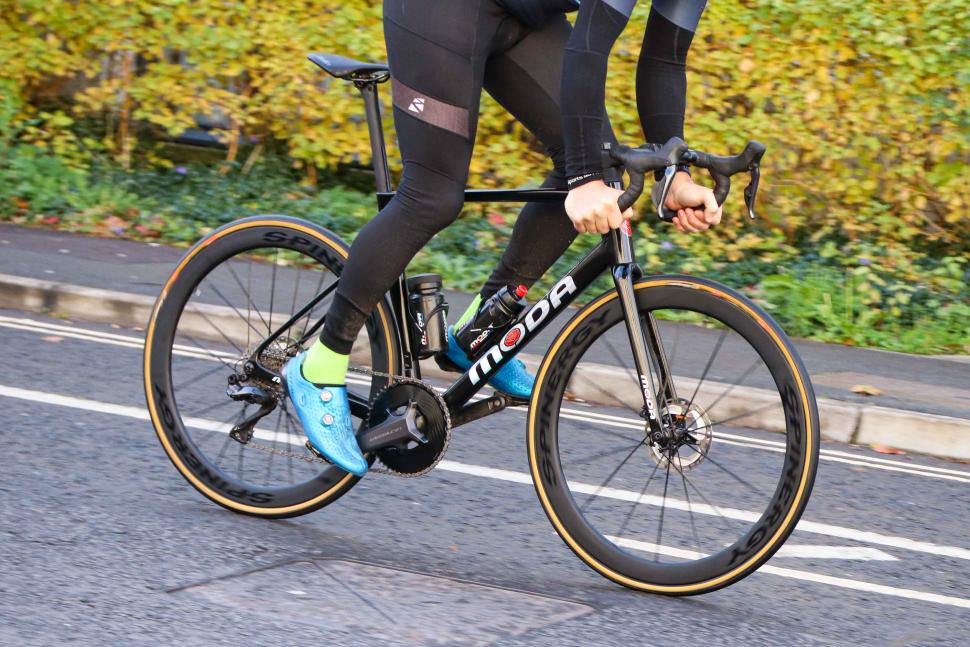 2023 Moda Alto Black Soul - riding 1.jpg
2023 Moda Alto Black Soul - riding 1.jpg£7,224.00
VERDICT:
Responsive race bike with a quality build that's fun to ride fast
Fast
Good ride quality
32mm tyre clearance
Good looks
Classified system is excellent
Not the lightest
Firm ride
Some rivals are a fair bit cheaper
Weight:
8,450g
Contact:
At road.cc every product is thoroughly tested for as long as it takes to get a proper insight into how well it works. Our reviewers are experienced cyclists that we trust to be objective. While we strive to ensure that opinions expressed are backed up by facts, reviews are by their nature an informed opinion, not a definitive verdict. We don't intentionally try to break anything (except locks) but we do try to look for weak points in any design. The overall score is not just an average of the other scores: it reflects both a product's function and value – with value determined by how a product compares with items of similar spec, quality, and price.
What the road.cc scores meanGood scores are more common than bad, because fortunately good products are more common than bad.
- Exceptional
- Excellent
- Very Good
- Good
- Quite good
- Average
- Not so good
- Poor
- Bad
- Appalling
The Moda Alto is a bike that feels fast and performs well, and if you like your quick bike to give you plenty of feedback then it'll certainly appeal. Ours came with the excellent Classified Powershift hub system which effectively replaces the front derailleur, and that completes a high-quality package very well; you'll need pretty deep pockets, though.
> Buy now: Moda Alto from £5,775 from Moda
Check out our guide to the best road bikes – find your perfect drop bar bike whatever your budget.
Moda Alto: The ride
The Alto is a very purposeful bike and it's definitely best when you've wound it up to a decent lick, when the reasonably aggressive position and deep wheels feel like they're rewarding you the most. With a stack-to-reach ratio in this XL size of 1.45 (1.41 for the medium, 1.35 in the smallest size), it's as aggressive as the frames that most WorldTour teams are riding, and you can tuck yourself out of the wind quite effectively. Even though it's not specifically an aero bike, I've set a few personal bests on downhill and flat segments during testing.
If you're putting the power down to get the speed up then the bike feels extremely solid; the oversize 41mm press-fit bottom bracket shell must make up a decent percentage of the Alto's 970g frame weight (size M) as it certainly feels like there's plenty of material down there.
That eagerness to transfer leg power to the tarmac is also great on short, punchy climbs and rolling stuff, where the Alto feels better than many bikes at maintaining speed over the crests. Even though it's not the lightest for the money, it feels like the kind of bike that would reward you in something like a crit race, where speeds are high and there's plenty of sprinting out of corners. The seat tube angle is reasonably steep, and that puts you in a position where you're pushed a bit forward, which generally feels a bit faster and I also find makes me reach for the drops more often.
Front-loading the bike can make the steering feel twitchy, but the one place the geometry of the Alto isn't especially aggressive is the head tube. Steering is pretty neutral, and there's plenty of feedback through the stiff front end. It's easy to pick your line on fast, flowing corners and it's pretty handy in tighter stuff too; the XL test bike has a wheelbase of just over a metre which is pretty compact for what is the largest size.
On longer climbs the Alto is very composed, and it's easy to settle in and pick a rhythm. At 8.45kg in this build it's light but not superlight; you can get lighter bikes for this sort of money and the Moda's nature on the climbs is more steady than eager. The benefit you feel from pushing up the speed is always a good incentive to try to push on when things start to flatten out, though.
Overall, I'd describe the ride of the Alto as firm. Even with big 30mm tyres (big for a race bike, anyway) pumped up not especially hard (I mostly ran them at 80/85psi front and rear) you'll be getting plenty of feedback about what's happening under your tyres. On bigger roads and smoother tarmac that can be welcome, but I found that the Alto wasn't as composed as some bikes I've ridden when the quality of the tarmac dropped, which it often does round here.
Of the road bikes I've ridden I'd put it towards the firmer end of the pack. Depending on what you'll be using the bike for, that might suit you, and it's certainly not a deal-breaker on a bike that Moda describes as 'the most performance focused frame in the Moda range'. You'll more likely be riding quickly for shorter distances than heading out on big epic adventures. It's an involving ride.
Moda Alto: Frame and fork
The Moda Alto is a true monocoque frame design, manufactured using unidirectional carbon and an EPS process. That's the same EPS you'll find in your bike helmet: the carbon layup is arranged around a solid expanded polystyrene core in the mould, rather than an inflatable bladder. That's then heated and cured as usual, and the EPS is removed to leave a hollow frame.
There are two main benefits of making frames this way. Firstly, the frame is a single piece – there's no need to layer extra carbon to join pieces together as you would otherwise need to, which adds weight and means that you don't necessarily get the carbon filaments going in the optimal direction under the surface, where they can't cross the join. Secondly, the EPS inner core gives the internal walls of the bike a perfectly smooth finish, where with bladders you can get ripples and extra material where there are creases in the bladder. That can save weight, and makes the material properties of the frame more consistent.
At 970g for a medium frame the Moda is very light, but not at the cutting edge; you maybe wouldn't expect it to rival something as high end as the Specialized Tarmac SL8 at 685g, but more direct competitors such as the Orro Gold STC (830g) come in a fair bit under the Moda too.
The quality of the finish is excellent, with gloss black paint and iridescent frame decals.
The directness and stiffness evident in both the pedalling and steering is explained by the use of a 1 1/2in head tube and an oversized PressFit 41 bottom bracket. Cabling and hose routing is all internal, via a DCR/ACR-compatible headset system. Our test bike came built up with 25mm of headset spacers.
At the back the seatstays are dropped, and there's a scoop in the seat tube to allow a shorter wheelbase while using a profiled tube. The top tube is flattened and you get a truncated-aerofoil-style aero seatpost.
Moda doesn't make any specific aero claims for the Alto, but it's hitting most of the current trends for an all-purpose-but-still-aero road bike. And it's definitely a bike that feels fast at the kind of speeds where those incremental aero gains start to rack up.
The frame is available in six sizes, covering riders from 150cm up to about 190cm. I'm at the very top end of that range and the XL is just big enough, with a reach of 404mm and stack of 585mm. It's more of an L than an XL really; many manufacturers will have a size bigger.
Moda Alto: Equipment
Our test bike was supplied with a mostly Shimano Ultegra Di2 drivetrain, but with an upgrade to a Classified two-speed rear hub, which is a £1,499 cost option for this bike, bringing the total to £7,274. Ultegra Di2 is, for me, the pick of Shimano's groupsets. We gave it a full five stars when we reviewed it last year, and described it as 'just brilliant'. Unless you want the bragging rights that come with Dura-Ace, or someone else is paying you to ride it, there's really no point spending twice as much for something that's functionally almost identical and only marginally lighter.
Shifting on the new Di2 is wireless from the lever to the main system in the body of the bike, so that's one less thing to have to poke through your headset here; only the brake hoses run through the steerer tube.
The battery is in the seatpost and a cable runs to the rear mech (and the front, if you're using one). The introduction of wireless hasn't affected the shifting at all, which remains crisp and predictable right across the cassette.
Braking on the new Ultegra groupset has incorporated the new Servo Wave design from Dura-Ace, which gives you more pad clearance at the rotor and a more progressive lever stroke. It turns out that my new shed with its wall-mounted rack is a good way to find out if there's any air in a brake system, as it tends to migrate to the lever or calliper depending on which way up the bike is. I did have to bleed the brakes on the Alto before riding it – well, after riding it very briefly and fortunately on the flat! – but it's a simple job if you have the right tools. I'd prefer it to be fully and thoroughly bled out of the box, though.
If you're not familiar with the Classified Powershift hub system then we reviewed it on road.cc at the end of last year. It's a two-speed hub that has a direct drive 1:1 ratio, and a reduction gear of about 70% giving you a similar range to a double chainring.
The internals of the hub are all sealed, and the system uses a specific thru-axle which contains a receiver and a rechargeable battery. It receives the shift command wirelessly and changes the hub via a contactless system. Shifts are super quick, quiet, and work under full load (up to 1,000W).
There's no setup or maintenance required, and because there's no front mech it's a lot easier to change your gear ratios by simply swapping out the front chainring. Our test bike had a 52T chainring, which is equivalent to running a 52/36 double. Well, 36.4, but close enough. But you could go for a 53 (53/37), 50 (50/35), 46 (46/33), 44 (44/31)... whatever you want, really.
The Classified system integrates neatly with Di2: you just use the lefthand shifter buttons like you normally would, and if you want different ratios, the capacity of the rear mech is plenty big enough to swap chainrings without faffing around with the chain length.
This is the first Classified-equipped bike I've used and I was really impressed. Shifting is instant and silent, and you get the psychological advantage of looking like you're climbing the steep stuff in the big ring, even though you're not. Every now and then I forgot which 'ring' I was in as there's no visual cue, and the specific chainring used on the Moda was a bit chattery on the bigger sprockets, but overall I think it's an excellent system. Removing the wheel is no harder than with any other thru-axle. Okay, £1,499 is a fairly high price for doing away with the front mech, which I'm not convinced I could justify, but your mileage may vary there.
The Classified rear hub replaces a standard hub in the Spinergy Carbon 4.7 wheelset. The 47mm rims have a reasonably narrow (these days) 18mm internal width, and the spokes are made from PBO, or poly(p-phenylene-2,6-bensobisoxazole) if you're into your chemistry. Spinergy's claim is that the material is three times stronger than steel, and half the weight, and that they also absorb more vibrations and combat rider fatigue.
It's always hard to isolate what comfort comes from frame, wheels or tyres, but like I said earlier, this is a pretty firm ride, even with 30mm Challenge Strada Pro TLR tyres, which we've previously praised for their ride quality. They're nice and grippy too.
The 47mm rim depth is in all-rounder territory; I found them mostly well behaved, although in beefier crosswinds they did occasionally catch the gusts. At 1,652g a pair (without the Classified system) they're about what you'd expect in terms of weight; lighter wheels are available.
The rest of the finishing kit is good quality. Moda's Carbon cockpit is very tidy and hides the brake hoses away well. It's size-specific depending on what frame size you buy; my test bike had a 44cm bar. I'd probably opt for something a little narrower if I was aiming to ride fast, but I had no issues with the shape, or the accessibility of the drops. There's a flat aero section on the tops and the Deda bar tape is decent.
The saddle is a Selle Italia SLR Boost, which I got on fine with and is a well-made saddle that should last; the two-bolt seatpost design makes it easy to tweak your saddle position.
Moda Alto: Value
At £5,775 without the Classified system even the standard build of the Alto is nudging toward superbike prices, and adding on another grand and a half for the rear hub would be a personal choice that I'm not sure I'd make, nice though it is. Let's instead rate it based on the double-chainring build, which makes comparisons easier, as not many other manufacturers offer the Powershift rear hub as an option.
Some bikes are more expensive: the £7,199 Basso Diamante we reviewed recently is more or less directly comparable: a low-slung, Ultegra Di2-equipped race machine. Stu was very impressed with the ride quality when he reviewed it, and it's a full kilo lighter, albeit in a smaller size. Pinarello's X3 will cost you £4,500 with a groupset a rung down and alloy wheels, so a comparable build would certainly be more expensive. We liked the Ridley Falcn RS, too, but an Ultegra Di2 build is going to set you back eight grand.
On the other hand, the Orro Gold STC is well-liked around these parts for its ride and also its value: an equivalent build of that frame is £4,899, and Orro is currently offering a Dura-Ace/Zipp 303 build for £6,599. The Merida Reacto is more aero specific but boasts similar geometry, and when Stu tested the Reacto 7000 he was, again, really impressed with the ride. Like the Moda it's not especially light, but an Ultegra Di2 build again comes in under five grand. The more comparable Scultura is a similar price.
Moda Alto: Overall
If I was looking for a bike to ride quickly and not especially far, the Moda Alto would be a solid choice: it has an involving ride and it's at its best when you're keeping the pressure on the pedals. For a road racing or crit bike, it's definitely doing a lot of the right things.
The Classified Powershift hub is certainly an excellent performer, and the rest of the build is as very good quality. The hub makes the bike pretty expensive, but even without that it feels a bit on the pricey side. Okay, some other options are much more expensive, but realistically the Moda brand isn't competing with the Pinarellos and Specializeds of this world, and it's not a standout bike when compared with a Merida, or Canyon, or Orro that you can pick up significantly cheaper. That's not to say it isn't a good bike; it certainly is. But if I had six grand (or seven) burning a hole in my pocket I don't think it would be at the very top of my list.
Verdict
Responsive race bike with a quality build that's fun to ride fast
road.cc test report
Make and model: Moda Alto Black Soul Classified
Size tested: XL, 58cm
About the bike
List the components used to build up the bike.
Material: Full carbon
Weave: UD
Headset size: Top 1-1/2 down 1-1/2 (special used headset)
Seatpost Length: 350mm (XL 400mm)
BB: BB41
Size: 46 (XXS) / 49 (XS) / 52 (S) / 54 (M) / 56 (L) / 58 (XL)
Front hanger: Monocoque fork, 100*12mm, flat mount disc brake 140 and 160 interchangeable
Rear hanger: 142*12mm
Cable routing: Full internal cable routing
Max tire: 700*32C
PLEASE NOTE: The prices above include a carbon bar/stem. From your local MODA stockist/dealer the Alto comes as standard with a DEDA SUPERBOX stem and alloy handlebar (-£200 off above prices) with the option to upgrade to the Moda Carbon bar/stem.
Build Details:
Wheels: Aksium Discs or Spinergy Upgrades (Aztec Rotors)
Chainset: Shimano Ultegra (Di2 12-Spd)
Chainset Size: Compact (XXS/XS/S - 170mm, M/L - 172.5mm, XL - 175mm)
Stem: Moda Carbon DCR Stem (Standard - XXS/XS - 9cm, S/M -10cm, L 11cm, XL - 12cm)
Handlebar: Moda Carbon monocoque handlebar matched with the DCR system - full internal cable routing (Standard - XXS/XS - 40cm, S/M - 42cm, L/XL - 44cm)
Saddle: Selle Italia SLR Boost
Tyres: Continental GTs 28mm - ALL BLACK (Challenge Tyres also available)
Cassette: 11-30 or 11-34
Tell us what the bike is for and who it's aimed at. What do the manufacturers say about it? How does that compare to your own feelings about the bike?
Moda says: "The MODA ALTO is all the 'knowledge' and feedback that MODA bikes have received from years of experience from countless races and our passionate MODA partners. The newly developed high-end UD carbon frame with EPS technology is equipped with a pressfit 41 oversize bottom bracket. The 1-1/2in head tube and manufactured to the latest technologies for clean internal DCR/ACR cable routing. Larger 32mm tyre clearance for maximum comfort on todays demanding roads. The ALTO excels in every way and is probably the most performance focused frame in the Moda range. Coming in at circa 970g for a size medium. In addition to its perfect form and its incredible race attributes, this bike impresses with its minimal outline and an outstanding sense of comfort and style, security and control. The ALTO, perfected by years of know-how, built for the demanding athlete."
Where does this model sit in the range? Tell us briefly about the cheaper options and the more expensive options
It's Moda's most expensive bike, especially with the Classified hub.
Frame and fork
Overall rating for frame and fork
9/10
Tell us about the build quality and finish of the frame and fork?
Very nicely finished and painted.
Tell us about the materials used in the frame and fork?
'Unidirectional full carbon' is as specific as Moda gets here.
Tell us about the geometry of the frame and fork?
Size XL
Stack: 585mm
Reach: 404mm
Head angle: 72.5°
Seat angle: 73.5°
Wheelbase: 1010mm
How was the bike in terms of height and reach? How did it compare to other bikes of the same stated size?
It was fine for me, although the XL is probably more an L.
Riding the bike
Was the bike comfortable to ride? Tell us how you felt about the ride quality.
The ride is pretty firm, even with 30mm tyres.
Did the bike feel stiff in the right places? Did any part of the bike feel too stiff or too flexible?
It's plenty stiff!
How did the bike transfer power? Did it feel efficient?
The power transfer is as direct as they come.
Was there any toe-clip overlap with the front wheel? If so was it a problem?
No issues during testing.
How would you describe the steering? Was it lively neutral or unresponsive? Pretty neutral overall.
Tell us some more about the handling. How did the bike feel overall? Did it do particular things well or badly?
The bike is racy and the wheelbase isn't long. It's agile, but didn't feel especially twitchy.
Which components had the most effect (good or bad) on the bike's comfort? would you recommend any changes?
The firm frame (and wheels) are mitigated a bit by the bigger tyres.
Which components had the most effect (good or bad) on the bike's stiffness? would you recommend any changes?
The frame and the wheels are rock solid for sprinting and pushing the pace on rolling terrain.
Which components had the most effect (good or bad) on the bike's efficiency? would you recommend any changes?
Hard to fault the efficiency.
Rate the bike for efficiency of power transfer:
10/10
Rate the bike for acceleration:
8/10
Responds well to your input, not the lightest though, so reaction isn't as instant as some.
Rate the bike for sprinting:
9/10
Rate the bike for high speed stability:
8/10
Rate the bike for cruising speed stability:
8/10
Rate the bike for low speed stability:
7/10
Rate the bike for flat cornering:
8/10
Rate the bike for cornering on descents:
8/10
Rate the bike for climbing:
7/10
The drivetrain
Rate the drivetrain for performance:
10/10
Rate the drivetrain for durability:
8/10
Rate the drivetrain for weight:
8/10
Rate the drivetrain for value:
6/10
Tell us some more about the drivetrain. Anything you particularly did or didn't like? Any components which didn't work well together?
Shimano Ultegra Di2 is hard to fault, and so is the Classified hub. Together they're not far off Dura-Ace prices, though.
Wheels and tyres
Rate the wheels for performance:
7/10
Rate the wheels for durability:
8/10
Rate the wheels for weight:
6/10
Rate the wheels for comfort:
6/10
Rate the wheels for value:
7/10
Tell us some more about the wheels.Did they work well in the conditions you encountered? Would you change the wheels? If so what for?
They were decent but they're not my favourite mid sections.
Rate the tyres for performance:
8/10
Rate the tyres for durability:
7/10
Rate the tyres for weight:
8/10
Rate the tyres for comfort:
9/10
Rate the tyres for value:
6/10
Tell us some more about the tyres. Did they work well in the conditions you encountered? Would you change the tyres? If so what for?
Good grip, lots of comfort.
Controls
Rate the controls for performance:
8/10
Rate the controls for durability:
8/10
Rate the controls for weight:
7/10
Rate the controls for comfort:
7/10
Rate the controls for value:
7/10
Tell us some more about the controls. Any particularly good or bad components? How would the controls work for larger or smaller riders?
Moda own brand bar and stem were good.
Your summary
Did you enjoy riding the bike? Yes
Would you consider buying the bike? Probably not.
Would you recommend the bike to a friend? Yes, depending on what they like from a road bike.
How does the price compare to that of similar bikes in the market, including ones recently tested on road.cc?
It's mid-range: Ultegra Di2 builds go up past £8k. But realistically it's also competing with some bikes (Orro Gold, Merida Scultura, Canyon Ultimate CF SL) that are a fair bit cheaper for a comparable spec.
Rate the bike overall for performance:
8/10
Rate the bike overall for value:
5/10
Use this box to explain your overall score
It's a solid performer, but not really doing enough to stand out against some bikes that are a fair bit cheaper. Worth a look if you're committed to speccing the Classified hub on a new bike, as not many brands offer that.
About the tester
Age: 50
I usually ride: whatever I'm testing... My best bike is: Kinesis Tripster ATR, Merida Scultura, Dward Design fixed
I've been riding for: Over 20 years I ride: Every day I would class myself as: Expert
I regularly do the following types of riding: road racing, commuting, touring, club rides, general fitness riding, fixed/singlespeed, Mountain Bike Bog Snorkelling, track
Dave is a founding father of road.cc, having previously worked on Cycling Plus and What Mountain Bike magazines back in the day. He also writes about e-bikes for our sister publication ebiketips. He's won three mountain bike bog snorkelling World Championships, and races at the back of the third cats.
Latest Comments
- Jbnuts 23 min 40 sec ago
I did similar. I found a Mapei-finished C59 disc frameset online and proceeded to build what I hoped would be a fantastic Colnago. It turned out...
- stonojnr 3 hours 50 min ago
exactly, thats my issue, how does knowing the speed, then change the perspective of a close pass ?...
- Dnnnnnn 4 hours 24 min ago
On the subject of value, it's also worth mentioning the discount available through Cycling UK and British Cycling? I also spotted 10% off at...
- NPlus1Bikelights 4 hours 47 min ago
We've saved them multiple times with Kick Starters. Shame. Edit: tense.
- NPlus1Bikelights 4 hours 50 min ago
Or the congregation reads the news and does not like all the stories about ignored abuse by senior members of the church.
- NPlus1Bikelights 4 hours 52 min ago
Kask remains sexier. And their prices, whilst high, are not as over the top as these.
- rookybiker 5 hours 14 min ago
> Are the ASO, basically saying it didn't happen The authority is the UCI. ASO was only the race organiser.
- brooksby 6 hours 26 min ago
I have a Grand Prix appointment next week anyway, so I may decide to discuss this with them instead of what I'd booked it for...
- David9694 6 hours 28 min ago
Come with me to Brockenhurst, New Forest. It has a train station and a bike shop and in the summer season the area attracts visitors, many of whom...
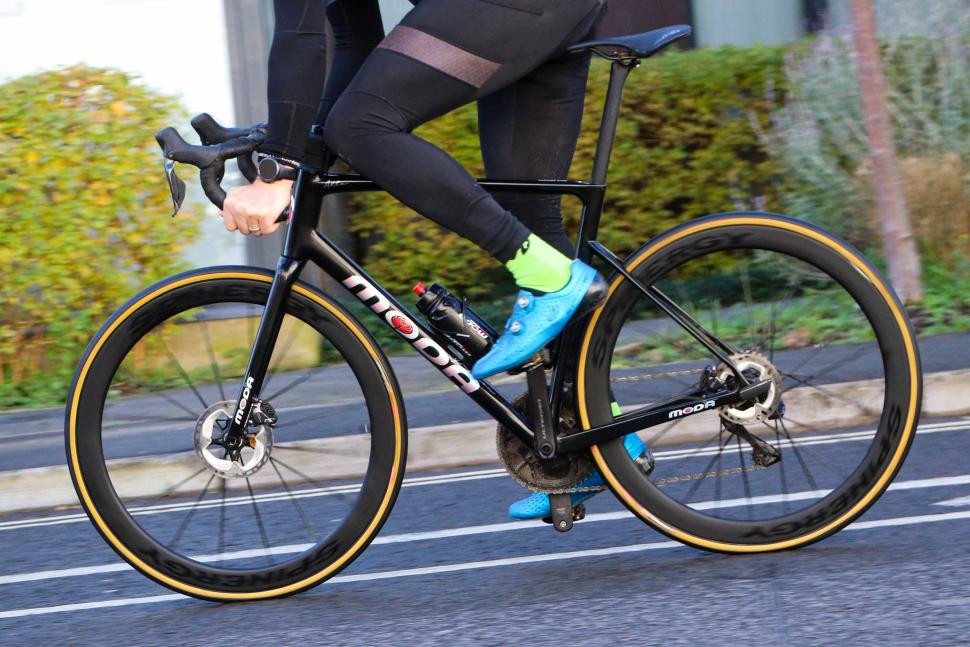
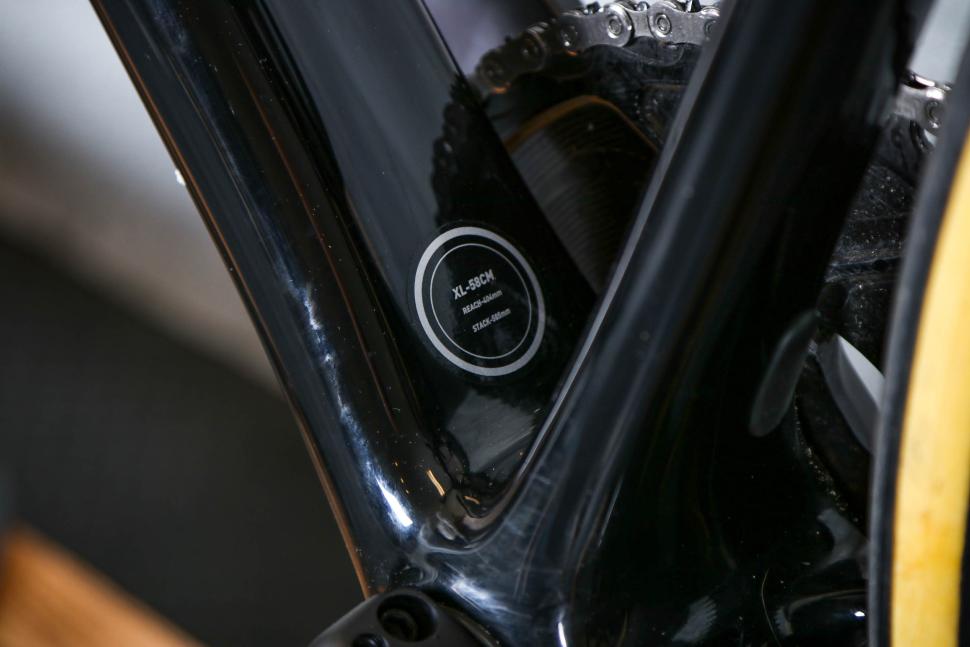

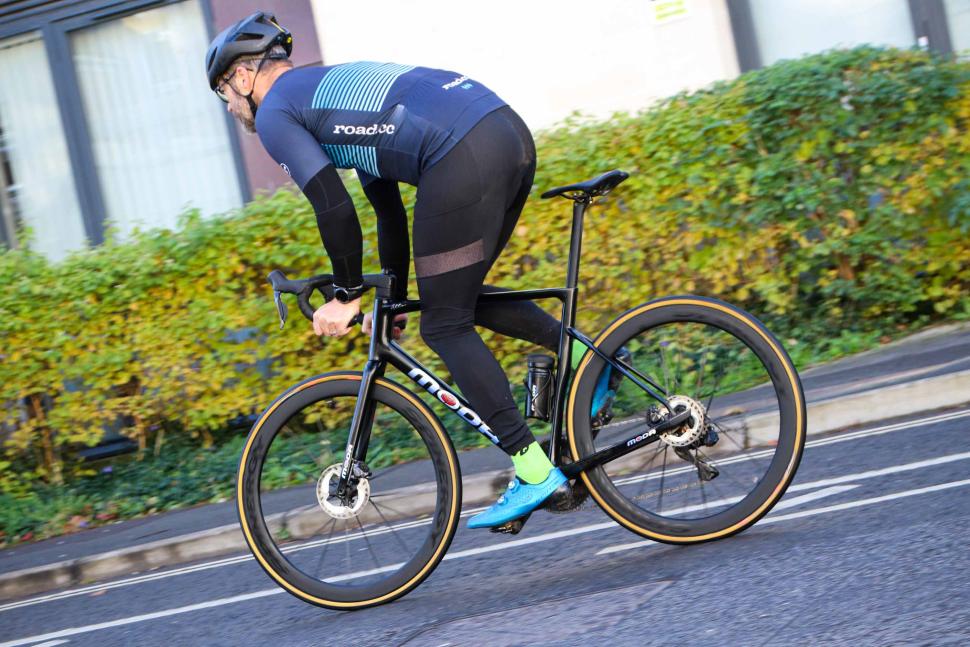
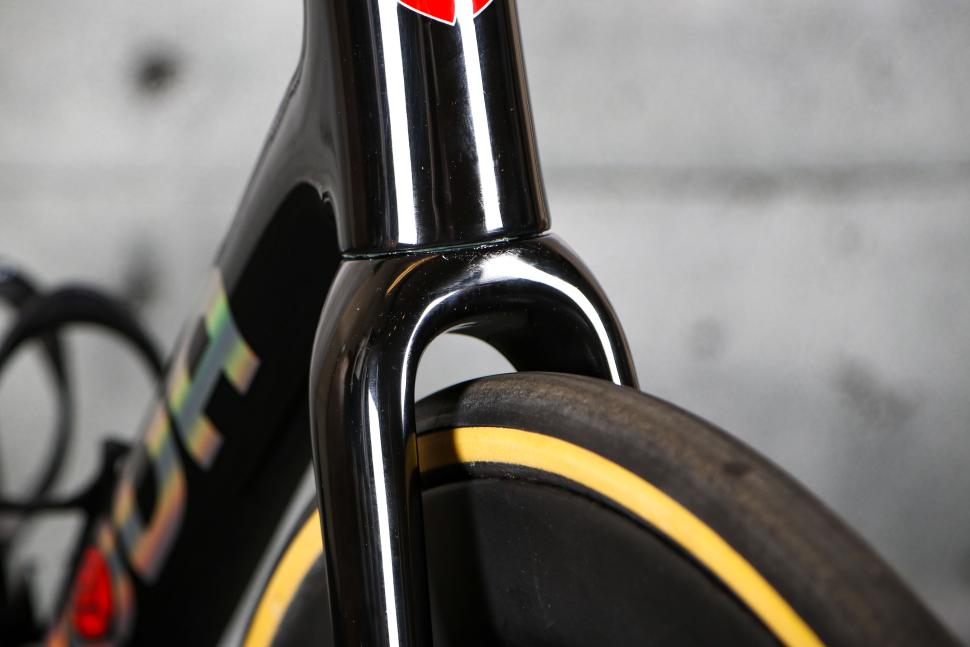












































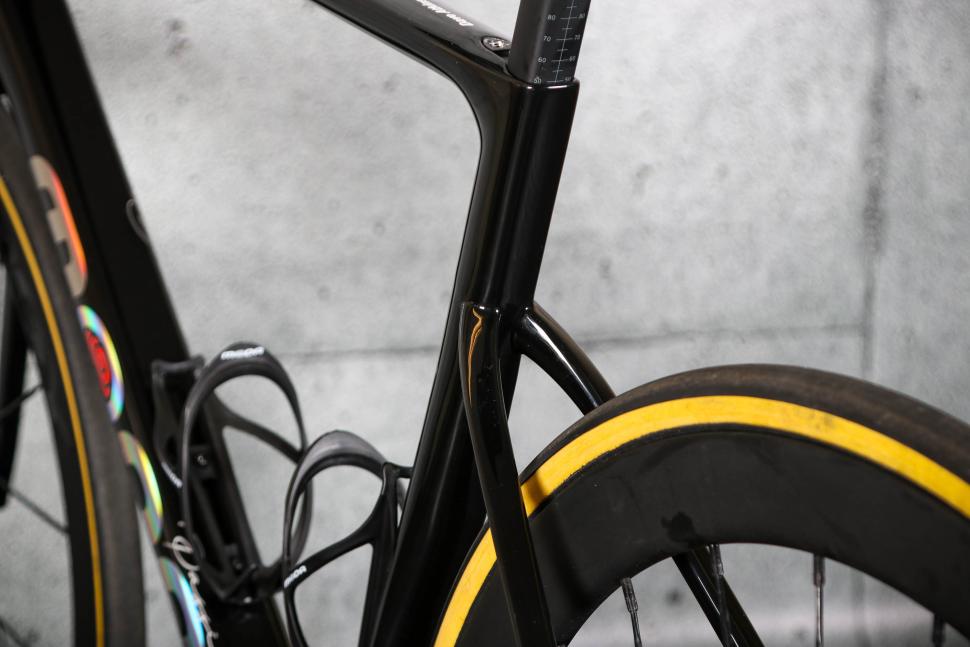


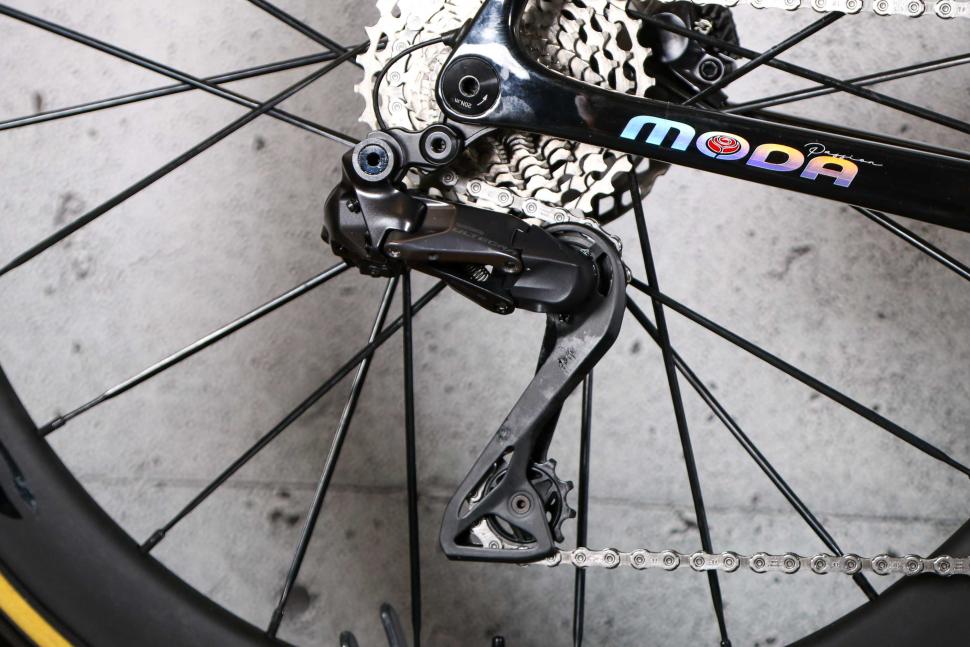
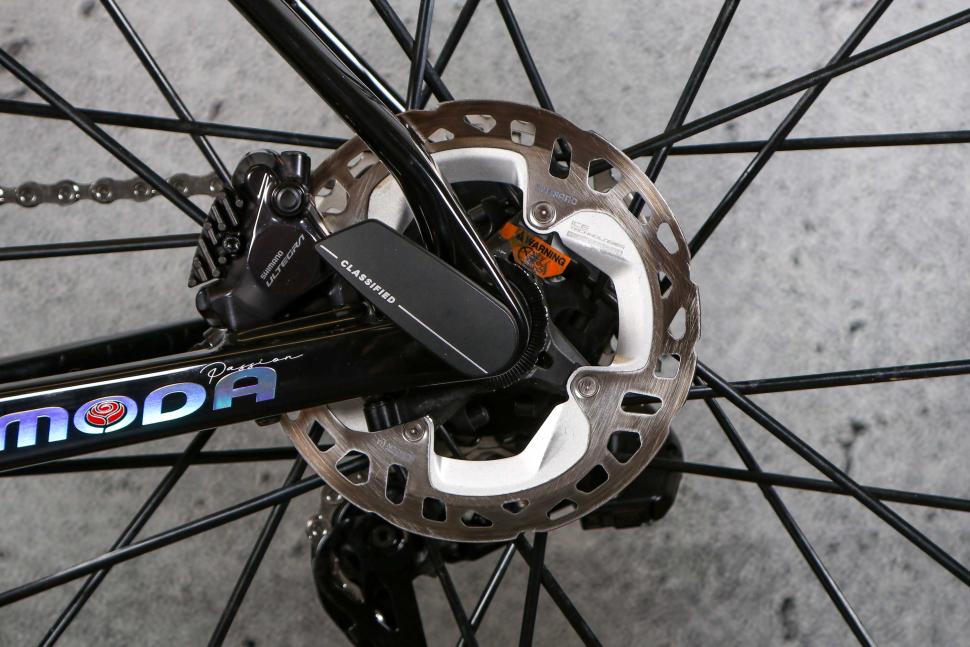








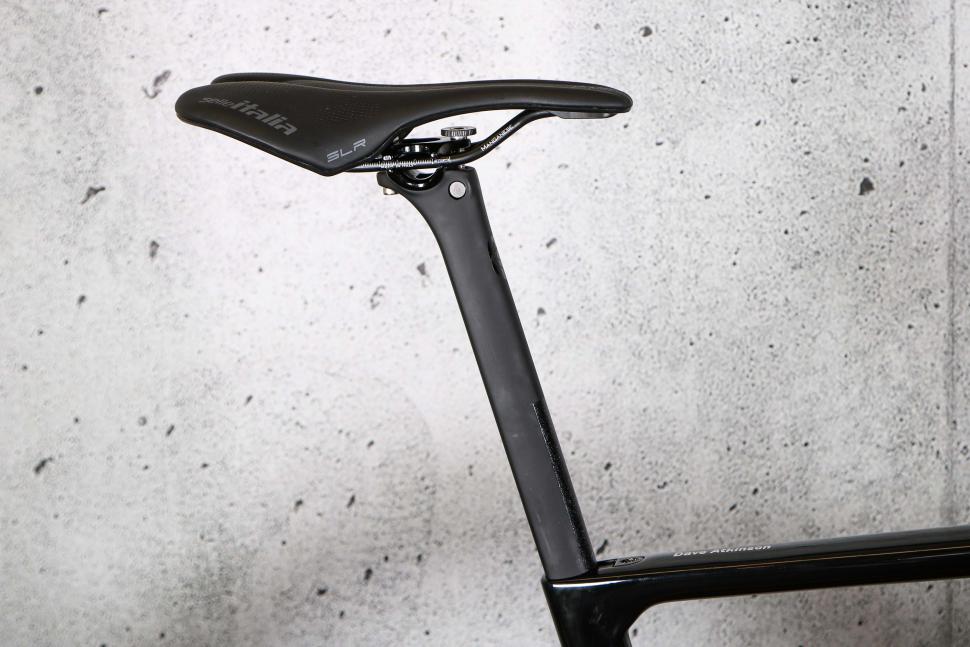
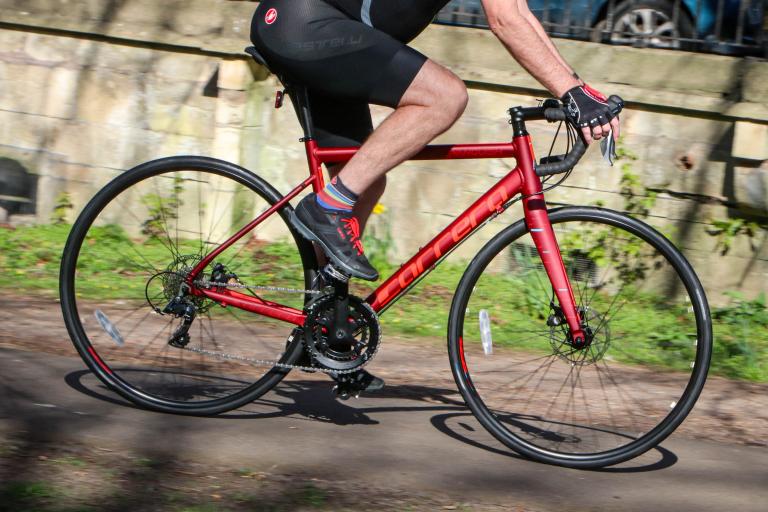
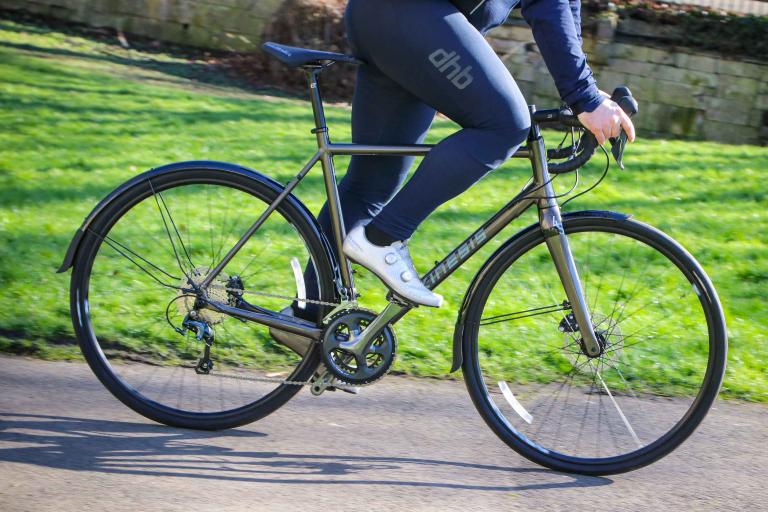
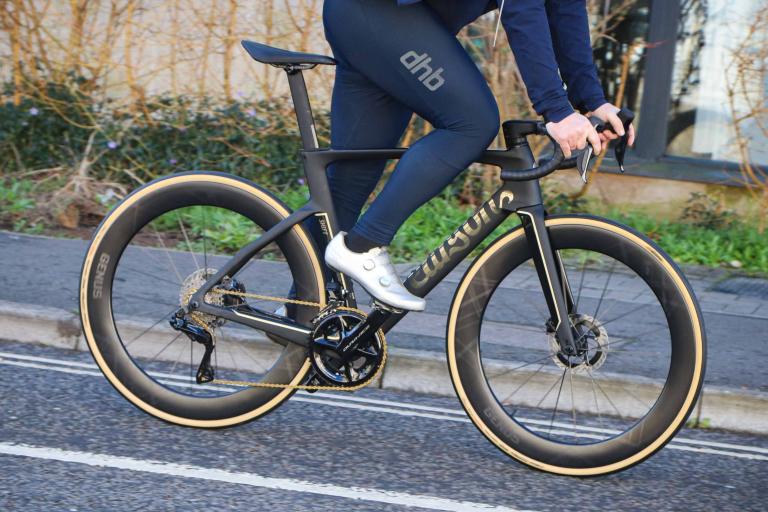
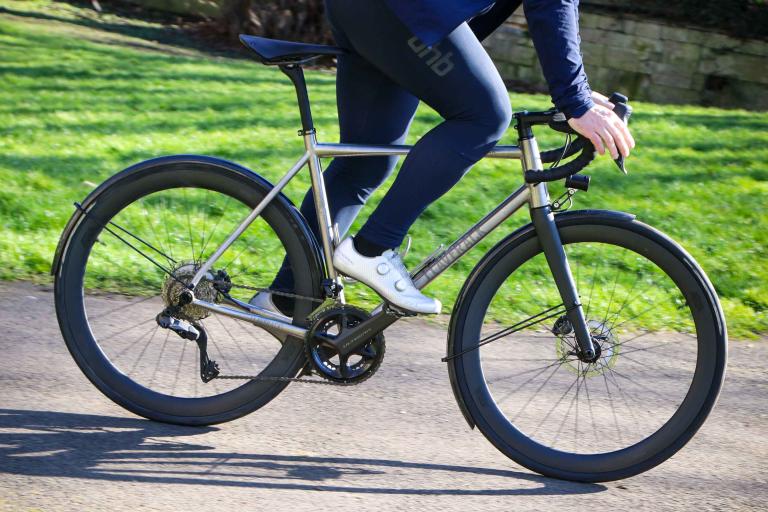
Add new comment
11 comments
I'm here for the nit-picking. You can't make narrow-wide chainrings with odd numbers of teeth, so choosing a 53 might be problematic on a bike like this.
Not a fan of the fake Italian bike branding and ripping-off the De Rosa logo. And not exactly pushing the envelope with their sustainability policy.
Definitely rather naff, smacks of the "Oakey" sunglasses and "Castalli" shorts available on various Chinese direct import websites. Quite surprised De Rosa haven't taken some sort of legal action, pretty blatant.
You ran the tyres too hard. 60psi is fine for 30mm tubeless tyres, 80/85 is too high. This would materially affect ride quality.
depends how heavy you are though, right?
Weight makes surprisingly little differance according to the Silca online calculator.
I say 80, @miller says 60, the Silca calculator says 72. let's all just get along, eh.
I guess the main point here is that i'm replicating my pressures from other bikes with 30mm tyres that I ride or have ridden, so that my impressions of how firm or soft the overall ride might be aren't skewed by that. Because dropping 20psi would certainly make it a more forgiving ride, but that would also be true for all those other bikes. It's impossible to control entirely for the tyres because different tyres offer different levels of comfort. But I'm doing my best.
Apologies if my tone was a bit strict. I do see why as a bike reviewing site you'd want to have some commonality across the various bikes you review. However, about tyres, I think it would be better to run them at the correct pressure for the tyres that are fitted so you're reviewing the complete package as it should be used.
Ah but I'd want him to run 30 or 32mm tubeless because that's what I use (at just below 60psi for 30 and less for 32)!!
I can see your point, but the issue as a reviewer is that you have to try to discern how the actual frame and fork ride: that's difficult, and it's made more difficult by bigger tyres which have a bigger effect overall. it came with 30mm tyres but for racing your preference may be for 28mm or 25mm tyres where the frame is going to have a bigger impact on the ride. it's a seven grand bike: you're probably going to fit your favourite tyres/saddle to it, so those bits of the build are materially less important.
Optima at 85 and 70 according to RH.